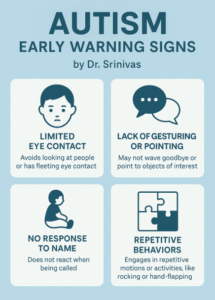🧩 Understanding the Early Warning Signs of Autism
Spotting the Clues, Supporting the Child, Sooner Than Later
🌱 Why Early Signs Matter
Autism Spectrum Disorder (ASD) is a neurodevelopmental condition that affects how a child interacts with the world. While the first signs often appear within the first 18–24 months of life, many families either miss or misinterpret these clues as personality quirks, stubbornness, or delayed development that will “catch up on its own.”
But here’s the truth:
Early detection of autism changes lives.
The sooner we recognize it, the sooner we can support development with therapies that work.

🧠 What is Autism?
Autism isn’t a disease—it’s a different way the brain develops and processes information. Children with autism may show differences in communication, social interaction, play, and behavior. These differences can range from subtle to significant.
The term “spectrum” reflects the wide variation in symptoms and abilities. Some children may be verbal but socially awkward, while others may not speak at all and show intense repetitive behaviors.
🔍 Early Warning Signs – What to Look For
Let’s explore the signs age-wise and developmental-domain wise, with real-life descriptions.
👶 0 to 12 Months: The Silent Beginnings
This is the phase when babies are supposed to look at you, respond to your face and voice, and show interest in people. In children later diagnosed with ASD, these responses may be missing or delayed.
🚩 Key Clues:
-
Limited eye contact (e.g., baby looks more at ceiling fans or lights than at faces)
-
Doesn’t smile back when smiled at by 6 months
-
Lack of babbling or cooing by 9 months
-
Doesn’t respond to name consistently by 9–12 months
-
Little interest in interactive games like peek-a-boo
🧒 12 to 24 Months: The Red Flags Become Clearer
This is the stage when most toddlers begin pointing to objects, speaking a few words, and engaging in basic pretend play. A lack of these milestones is a strong signal.
🚩 Key Clues:
-
No single meaningful words by 16 months
-
No two-word phrases by 24 months
-
Doesn’t point to show interest (“Look, a bird!”)
-
No pretend play (e.g., feeding a doll, pretending to talk on a toy phone)
-
Doesn’t bring toys to share interest with caregivers
Parents may hear comments like:
“He’s just quiet,” or “Boys talk late.” While not all delays mean autism, lack of pointing, gestures, and social sharing are more significant than speech delay alone.
👦 2 to 4 Years: Behavioral Patterns and Rigidities Appear
At this stage, some children begin to show more obvious signs:
-
Repetitive behaviors (hand-flapping, spinning)
-
Intense focus on objects (wheels of a toy car, lining up toys)
-
Difficulty adjusting to changes in routine
-
Poor response to others’ emotions (e.g., not reacting to a crying sibling)
-
Speaking in a robotic or singsong tone, or repeating TV phrases (echolalia)
Some children may develop normally and then regress—stopping speech, losing social interest, or withdrawing into repetitive play.
🔁 Sensory Signs Across Ages
Children with autism may:
-
Cover ears to soft sounds
-
Seek strong sensory input (rocking, crashing into furniture)
-
Avoid certain textures, refuse foods due to smell/feel
-
Stare at lights, spin objects, flap hands when excited
These are not “bad habits”—they’re often how their brains are processing the world.
🛠️ What Should Families Do?
If you notice multiple early signs:
-
Don’t wait and watch. Act.
-
Share your concerns with a pediatrician.
-
Use screening tools like M-CHAT-R/F (for 16–30 months age group).
-
-
Request a referral to a developmental pediatrician, child psychiatrist, or psychologist.
-
Start early intervention—speech therapy, occupational therapy, and parent-mediated play therapy can make a huge difference, even before diagnosis is confirmed.
👨👩👧👦 Common Misconceptions
| Myth | Reality |
|---|---|
| “Boys talk late” | True for some, but social and gesture delays matter more |
| “He’s just naughty / hyper” | Autism is not about naughtiness—it’s about neurodevelopment |
| “It’s because we gave a phone too early” | Screen overuse may delay speech but doesn’t cause autism |
| “Let’s wait till school starts” | Delay = missed learning windows in brain development |
💬 Final Takeaway
Autism doesn’t mean a child can’t live a fulfilling, connected, and joyful life.
But that journey starts with recognizing the signs, accepting them without fear, and seeking help early.
Early is not just better. In autism, early is everything.
👨⚕️ About the Author
Dr. Srinivas Rajkumar T, MBBS, MD (Psychiatry)
Consultant Psychiatrist | Apollo Clinics Velachery & Tambaram
Specialist in Developmental Psychiatry & Early Intervention
📞 Appointments: 85951 55808
🌐 Visit: www.srinivasaiims.com